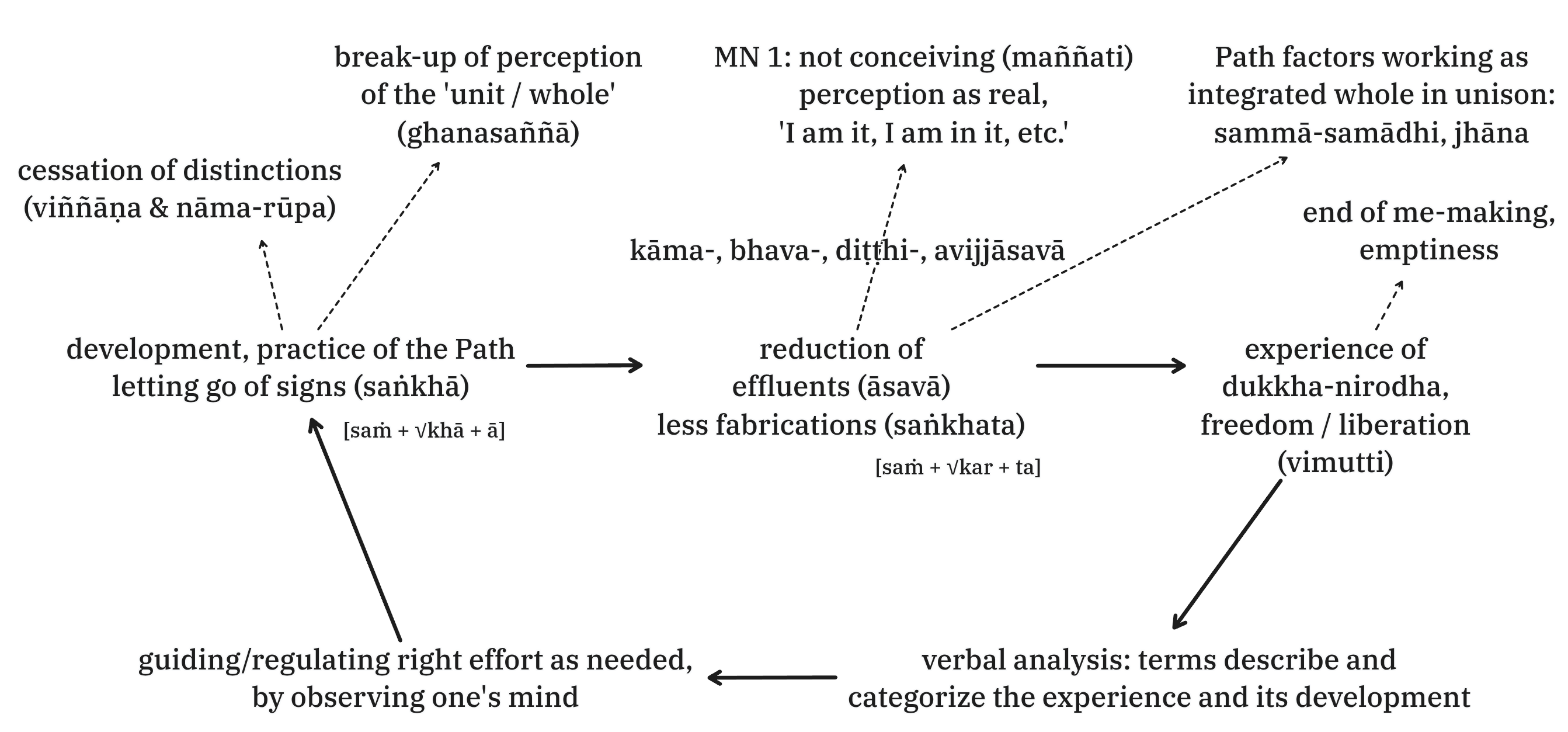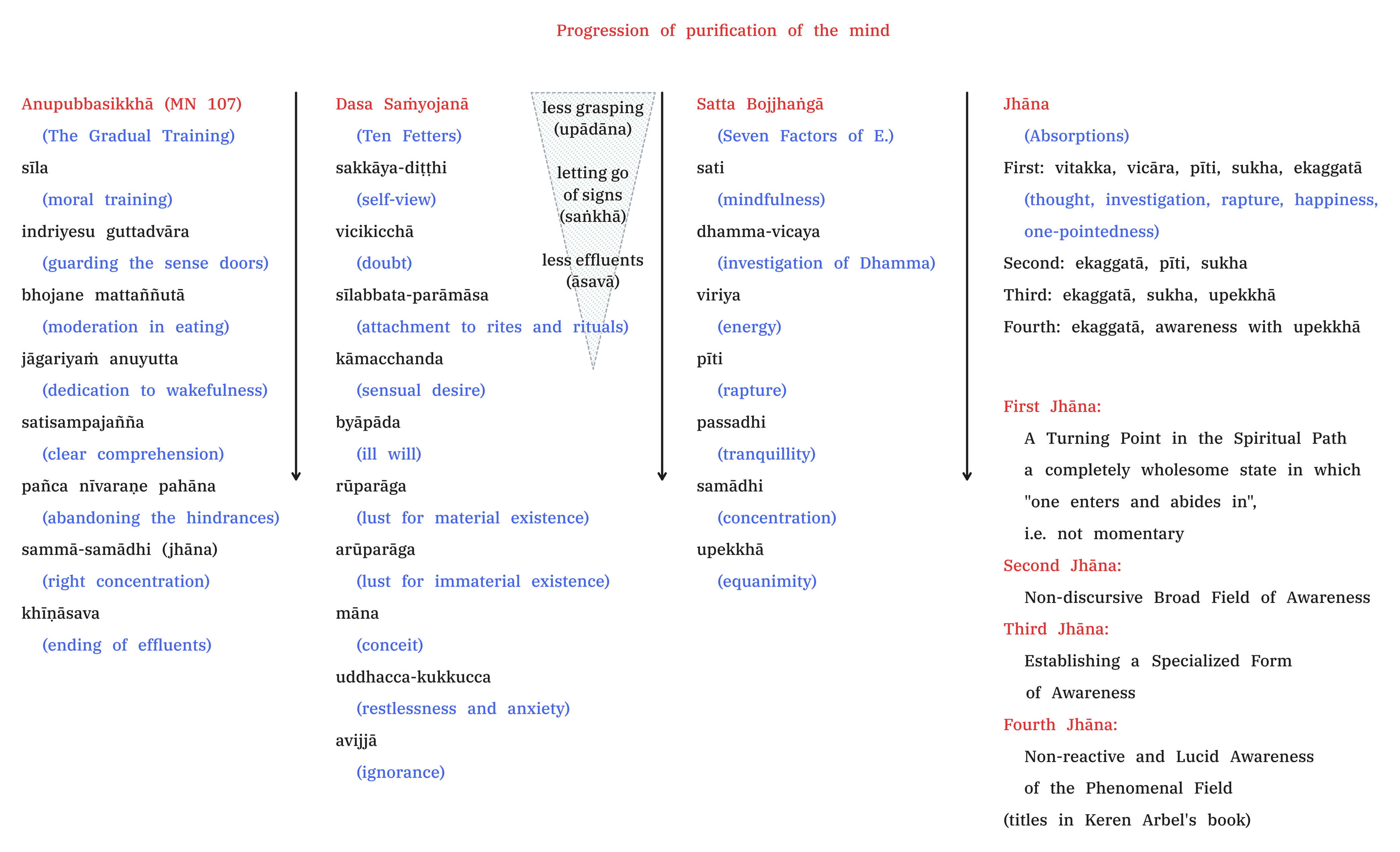2025-07-29
Quotes
Snp 3.11 jhāyati → jhāna (SSP)
Sa jhānapasuto dhīro, / Vanante ramito siyā;
Jhāyetha rukkhamūlasmiṁ, / Attānamabhitosayaṁ.
The sage, firmly intent on jhāna / should find delight in the forest;
should meditate at the root of a tree, / completely content in himself.
SN 53.1-12 Slopes and inclines to Nibbāna (SSP)
Seyyathāpi, bhikkhave, gaṅgā nadī pācīnaninnā pācīnapoṇā pācīnapabbhārā;
evameva kho, bhikkhave, bhikkhu cattāro jhāne bhāvento cattāro jhāne bahulīkaronto
nibbānaninno hoti nibbānapoṇo nibbānapabbhāro.
Bhikkhus, just as the river Ganges slants, slopes and inclines to the east; in the same way, a bhikkhu who develops and cultivates the four absorptions slants, slopes, and inclines to Nibbāna.
MN 43 Abandoned five, possessing five factors (SSP)
Paṭhamaṁ kho, āvuso, jhānaṁ pañc'aṅga'vippahīnaṁ, pañc'aṅga'samannāgataṁ.
Idhāvuso, paṭhamaṁ jhānaṁ samāpannassa bhikkhuno kāmacchando pahīno hoti, byāpādo pahīno hoti,
thinamiddhaṁ pahīnaṁ hoti, uddhaccakukkuccaṁ pahīnaṁ hoti, vicikicchā pahīnā hoti;vitakko ca vattati, vicāro ca pīti ca sukhañca cittekaggatā ca.
| vitakka (m.) | thought; reflection; pondering |
| vattati | occurs; happens; takes place |
| vicāra (m.) | consideration; examination; pondering; lit. causing to move around [vi + √car + *e + a] |
| pīti (f.) | delight; heartfelt joy; lit. lovely feeling [√pī + ti] |
| sukha (nt.) | ease; comfort; happiness; contentment [√sukh + a] |
| cittekaggatā (f.) | mental unification; oneness of mind |
| ekaggatā (f.) | unification; oneness; lit. one place state [eka + agga + tā] |
AN 1.53-55 Metta even for a finger-snap (SSP)
"Accharāsaṅghātamattampi ce, bhikkhave, bhikkhu mettācittaṁ āsevati / bhāveti / manasi karoti;
Ayaṁ vuccati, bhikkhave: 'bhikkhu arittajjhāno viharati satthusāsanakaro ovādapatikaro,
amoghaṁ raṭṭhapiṇḍaṁ bhuñjati'. Ko pana vādo ye naṁ bahulīkarontī"ti.
| āsevati | applies oneself (to); engages (with); practices; pursues |
| bhāveti | cultivates; develops; lit. causes to become [√bhū + *e + ti] |
| manasi karoti | pays attention; bears in mind; lit. makes in mind |
| arittajjhāna | not devoid of meditation attainment [aritta + jhāna] |
| amogha (adj.) | fruitful; not in vain; not futile |
| raṭṭhapiṇḍa (m.) | country's alms food; food from the people |
See SN 46.54, metta cetovimutti: abandons clinging to perceptions of attractive / unattractive
DN 29, Four benefits of indulging in the pleasure of jhāna
- Exhausting, depleting (parikkhaya) the first three fetters, stream entry, destined for full awakening
- Weakening rāga-dosa-moha, once-returner
- Exhausting the five lower fetters, non-returner
- Wearing away of the effluents āsavānaṁ khayā → paññāvimutti, arahant
SN 48.10 Dutiyavibhaṅgasutta
Katamañca, bhikkhave, samādhindriyaṁ? Idha, bhikkhave, ariyasāvako vossaggārammaṇaṁ karitvā
labhati samādhiṁ, labhati cittassa ekaggataṁ.So vivicceva kāmehi vivicca akusalehi dhammehi savitakkaṁ savicāraṁ vivekajaṁ pītisukhaṁ
paṭhamaṁ jhānaṁ upasampajja viharati.Vitakkavicārānaṁ vūpasamā ajjhattaṁ sampasādanaṁ cetaso ekodibhāvaṁ avitakkaṁ avicāraṁ
samādhijaṁ pītisukhaṁ dutiyaṁ jhānaṁ upasampajja viharati.
samādhi [saṁ + ā + √dhā + i]: the "placing (√dhā) (of the mind) on (ā) (an object) in an integrated way (saṁ)" (Aj Kovilo)
AN 6.63: "Saṅkapparāgo purisassa kāmo" (SSP)
| vossagga (m.) | relinquishment; release; letting go; surrender |
| ārammaṇa (nt.) | base; basis; foundation; support |
| vivicca (ger. +abl) | separating (from); aloof (from) |
| vivekaja (adj.) | born from seclusion [viveka + ja] |
| upasampajja (ger.) | reaching; attaining; arriving at |
| vūpasama (m. +gen) | peace (of); calming (of); subsiding (of) |
| ajjhatta | |
| sampasādana (nt.) | calming; tranquillising |
| ekodibhāva (m.) | singleness; unification; lit. unified state [ekodi + bhāva] |
| samādhija (adj.) | born from stable mind; produced by samadhi; [samādhi + ja] |
Pītiyā ca virāgā upekkhako ca viharati sato ca sampajāno sukhañca kāyena paṭisaṁvedeti
yaṁ taṁ ariyā ācikkhanti 'upekkhako satimā sukhavihārī'ti tatiyaṁ jhānaṁ upasampajja viharati.
| virāga (m. +gen.) | fading (of); disappearance (of) |
| paṭisaṁvedeti | personally experiences; undergoes; feels |
| ācikkhati | informs; talks about; describes |
Sukhassa ca pahānā dukkhassa ca pahānā pubbeva somanassadomanassānaṁ atthaṅgamā
adukkhamasukhaṁ upekkhāsatipārisuddhiṁ catutthaṁ jhānaṁ upasampajja viharati
--- idaṁ vuccati, bhikkhave, samādhindriyaṁ.
| pahāna (nt. +gen) | giving up (of); letting go (of); abandoning (of) |
| pubbeva (+abl) | as before |
| somanassa-domanassa (nt.) | (mental) pleasure and displeasure; satisfaction and dissatisfaction |
| atthaṅgama (m. +gen) | disappearance (of); vanishing (of); subsiding (of) |
| upekkhāsatipārisuddhi (adj.) | purification of awareness by equanimity [upekkhā + sati + pārisuddhi] |
Progression of purification of the mind


Ud 4.1 Meghiyasutta
(SC, SSP) Ven. Meghiya, while being the Buddha's attendant, insists to leave the Buddha and go to meditate
in a mango grove. While there, his mind is filled with hindrances. When he returns, the Buddha praises
staying with good friends and companions for abandoning the unskilful and developing the skilful qualities
of the mind. Furthermore:
Tena ca pana, meghiya, bhikkhunā imesu pañcasu dhammesu patiṭṭhāya
cattāro dhammā uttari bhāvetabbā --- asubhā bhāvetabbā rāgassa pahānāya,
mettā bhāvetabbā byāpādassa pahānāya, ānāpānassati bhāvetabbā vitakkupacchedāya,
aniccasaññā bhāvetabbā asmimānasamugghātāya.
Aniccasaññino hi, meghiya, anattasaññā saṇṭhāti, anattasaññī asmimānasamugghātaṁ pāpuṇāti
diṭṭheva dhamme nibbānan'ti.
| patiṭṭhāya (ger. +loc) | firmly grounded (in); well established (in); [pati + √ṭhā + ya] |
| vitakkupaccheda (m.) | cutting off thinking; silencing thought [vitakka + upaccheda] |
| asmimānasamugghāta (m.) | eradicating the idea 'I am' [asmimāna + samugghāta] |
| aniccasaññino (m.pl.) | those who perceive impermanence (in) [anicca + saññī] |
| saṇṭhāti (pr. +loc) | remains (in); is established (in); [saṁ + √ṭhā + a + ti] |
| pāpuṇāti (pr. +acc) | reaches; arrives (at) |
| diṭṭheva dhamme | in this life; right here right now; in the present; |
| lit. even in seen things [diṭṭhe + eva + dhamme] |
Related: Does the aims of breathing training is to cut off thoughts totally? (dhammawheel.com)
Canonical jhāna VS Visuddhimagga / Commentarial jhāna
In the canonical suttas, abandoning the hindrances leads to sammā-samādhi, which is described as the four jhānas, hence they are an integral part of the Path which leads to the cessation of dukkha, and the texts confirm that practising them is leading to Nibbāna (e.g. DN 29).
The suttas also describe the four formless attainments (/āruppa, arūpa samāpatti, "vimokkhā atikkamma rūpe āruppā"/) which are available for meditators but are not necessary for the Path, and (the attainments in themselves) are not leading to Nibbāna. (MN 26: nāyaṁ dhammo ... na sambodhāya na nibbānāya saṁvattati).
See also vimokkha in Nyanatiloka's Buddhist Dictionary for aṭṭha vimokkhā, the eight liberations, the 8th being nirodha-samāpatti.
The Visuddhimagga introduced the samatha VS vipassana practice as distinct categories, including the four jhānas and four āruppa formless attainments in samatha. Due to this mixing of categories, jhāna came to include the āruppas, sometimes referred to as arūpa-jhānas in the Visuddhimagga.
(The term arūpa-jhāna does not exist in the suttas, since the canonical jhāna does not include the arūpa samāpatti attainments.)
From this originates the commentarial notion of sukkha-vipassaka (dry-insight) arahants, who attain awakening without experiencing jhānas -- but this jhāna refers to the āruppas, which were not part of the canonical term jhāna.
The Visuddhimagga also introduced the terms of khaṇika- (momentary), upacāra- (access/neighbourhood), and appanā-samādhi (fixed/absorption) concentration as another way of categorizing states and degrees of absorptions.
Further reading
Early Buddhist Meditation by Keren Arbel (2015)
- The Four Jhanas as the Actualization of Insight
- https://kerenarbel.com/en/
- a summary article of the book (PDF)
What You Might not Know About Jhāna & Samādhi by Kumāra Bhikkhu (EPUB)
- Comparing the change of 'jhāna' terminology as used in the Canon and the Visuddhimagga
The Way of Buddhist Meditation by Ven Kheminda (1980)
- Serenity and insight according to the Pali Canon
- the vipassana VS samatha division, jhāna and satipaṭṭhāna
- Upacāra-samādhi: 'access' or 'neighbourhood' concentration, suppresses the five hindrances
